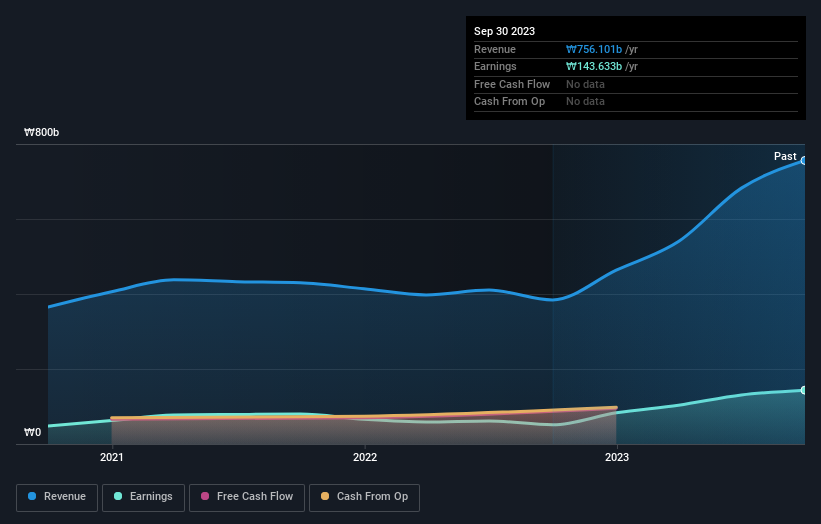Gravity Co., Ltd.'s (NASDAQ:GRVY) largest shareholders are public companies with 59% ownership, individual investors own 31%
Key Insights
Significant control over Gravity by public companies implies that the general public has more power to influence management and governance-related decisions
The largest shareholder of the company is GungHo Online Entertainment, Inc. with a 59% stake
Ownership research, combined with past performance data can help provide a good understanding of opportunities in a stock
If you want to know who really controls Gravity Co., Ltd. (NASDAQ:GRVY), then you'll have to look at the makeup of its share registry. We can see that public companies own the lion's share in the company with 59% ownership. Put another way, the group faces the maximum upside potential (or downside risk).
Meanwhile, individual investors make up 31% of the company’s shareholders.
In the chart below, we zoom in on the different ownership groups of Gravity.
See our latest analysis for Gravity
What Does The Institutional Ownership Tell Us About Gravity?
Many institutions measure their performance against an index that approximates the local market. So they usually pay more attention to companies that are included in major indices.
We can see that Gravity does have institutional investors; and they hold a good portion of the company's stock. This can indicate that the company has a certain degree of credibility in the investment community. However, it is best to be wary of relying on the supposed validation that comes with institutional investors. They too, get it wrong sometimes. It is not uncommon to see a big share price drop if two large institutional investors try to sell out of a stock at the same time. So it is worth checking the past earnings trajectory of Gravity, (below). Of course, keep in mind that there are other factors to consider, too.
We note that hedge funds don't have a meaningful investment in Gravity. GungHo Online Entertainment, Inc. is currently the largest shareholder, with 59% of shares outstanding. With such a huge stake in the ownership, we infer that they have significant control of the future of the company. With 2.7% and 2.3% of the shares outstanding respectively, Morgan Stanley, Investment Banking and Brokerage Investments and Acadian Asset Management LLC are the second and third largest shareholders.
While it makes sense to study institutional ownership data for a company, it also makes sense to study analyst sentiments to know which way the wind is blowing. We're not picking up on any analyst coverage of the stock at the moment, so the company is unlikely to be widely held.
Insider Ownership Of Gravity
While the precise definition of an insider can be subjective, almost everyone considers board members to be insiders. The company management answer to the board and the latter should represent the interests of shareholders. Notably, sometimes top-level managers are on the board themselves.
I generally consider insider ownership to be a good thing. However, on some occasions it makes it more difficult for other shareholders to hold the board accountable for decisions.
We note our data does not show any board members holding shares, personally. Given we are not picking up on insider ownership, we may have missing data. Therefore, it would be interesting to assess the CEO compensation and tenure, here.
General Public Ownership
The general public, who are usually individual investors, hold a 31% stake in Gravity. This size of ownership, while considerable, may not be enough to change company policy if the decision is not in sync with other large shareholders.
Public Company Ownership
We can see that public companies hold 59% of the Gravity shares on issue. It's hard to say for sure but this suggests they have entwined business interests. This might be a strategic stake, so it's worth watching this space for changes in ownership.
Next Steps:
I find it very interesting to look at who exactly owns a company. But to truly gain insight, we need to consider other information, too.
I like to dive deeper into how a company has performed in the past. You can access this interactive graph of past earnings, revenue and cash flow, for free.
Of course, you might find a fantastic investment by looking elsewhere. So take a peek at this free list of interesting companies.
NB: Figures in this article are calculated using data from the last twelve months, which refer to the 12-month period ending on the last date of the month the financial statement is dated. This may not be consistent with full year annual report figures.
Have feedback on this article? Concerned about the content? Get in touch with us directly. Alternatively, email editorial-team (at) simplywallst.com.
This article by Simply Wall St is general in nature. We provide commentary based on historical data and analyst forecasts only using an unbiased methodology and our articles are not intended to be financial advice. It does not constitute a recommendation to buy or sell any stock, and does not take account of your objectives, or your financial situation. We aim to bring you long-term focused analysis driven by fundamental data. Note that our analysis may not factor in the latest price-sensitive company announcements or qualitative material. Simply Wall St has no position in any stocks mentioned.


